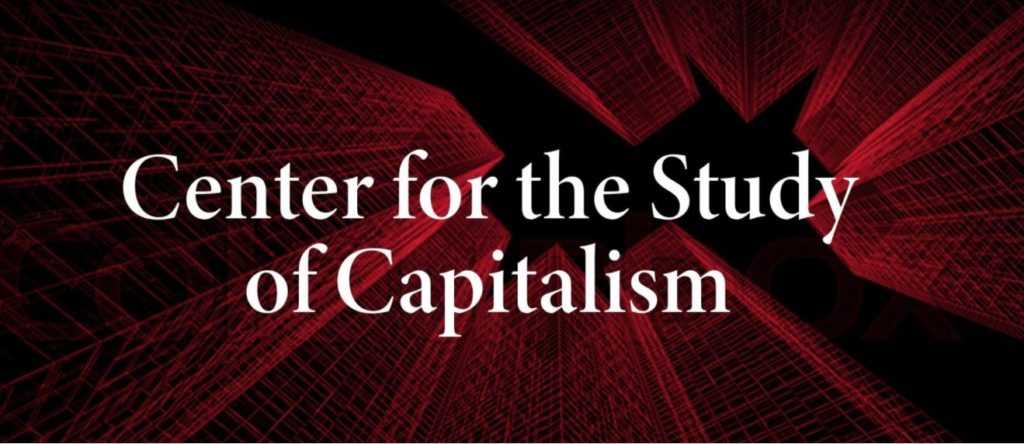Wake Forest’s Center for the Study of Capitalism: Can Capitalism Really Be “For Humanity?”




The Center for the Study of Capitalism (CSC), part of the Wake Forest School of Business, believes that capitalism is key to any sustainable solution to the world’s thorniest problems. Capitalism has survived and thrived in no small part because it is uniquely structured to make self-interest serve the wider interest. When capitalism functions well, creative, disciplined problem-solvers develop markets through free and fair trade, generating benefits for all of society.
Yet, many young adults don’t see things this way. In fact, many think that capitalism is at the root of many of the problems we face. So, does promoting capitalism run against our university’s motto: Pro Humanitate? We think not. We believe that promoting and supporting our country’s economic system is definitely in concert with being “for humanity.”
Wake’s historic mission to improve the human condition asks us to think about how to live – and to help others live – a long, healthy, and good life. At the core of CSC’s agenda is understanding what is meant by “a good life” and how not just businesspeople, but business itself, can contribute to that.
Any well-functioning business must make a profit, but CSC is exploring the motivations that drive inventors, entrepreneurs, and visionaries toward a balance of obligations to themselves and to others.
Adam Smith’s foundational belief about capitalism, confirmed by social psychologists, is that an innate desire to be seen as a decent person is one of the most powerful drivers of human behavior. This is what helps balance the self-interest needed to ensure our own well-being with our innate interest in caring for others. Achieving a balance between self-interest and our obligation to others is a challenge. It’s a challenge because any effort toward achieving a balance is inseparable from the political, economic, and cultural systems that both govern and liberate us. We build systems, such as governments, to help us, but there are still inherent tensions between addressing individual versus collective needs.
At CSC we recognize that many young people do not trust or respect our economic and political systems. Recent research conducted by the Edelman Trust Barometer suggests that many young adults do not believe that capitalism offers meaningful opportunities for personal and professional advancement. They also feel that progress, especially technological progress, does not lift society as it once did and is not necessarily a good thing for humanity. Part of CSC’s mission is to help millennials and Gen Z’s understand that well-functioning capitalism is the best tool humanity has to create opportunities and ensure that technology provides what it is supposed to, which is a better life for all.
Business, like society, is wrestling with genuinely existential challenges in such areas as climate change, human health, education, and cooperation between public and private entities. How, for example, can business address global warming and environmental issues while still spurring global development?
Business has an important role to play in developing and implementing solutions to the problems mentioned above. For this reason, CSC is delighted to partner with “This Is Capitalism.” The site celebrates great U.S. capitalists, entrepreneurs, and innovators, examines the values and motives that drive them, and highlights the role that availability and deployment of capital plays in creating better lives for everyone.
Wake MBA alum Warren Stephens, the chairman, president, and CEO of financial services firm Stephens Inc., and the driving force behind “This Is Capitalism,” has joined CSC as an Executive Affiliate. His participation as an Executive Affiliate gives “This Is Capitalism” and CSC the opportunity to collaborate on creating content that explores the attributes of capitalism and how it ensures an economy open to all.
CSC is carrying out its mission by creating curricula for learners of all ages and launching a dynamic series of symposia, podcasts, and online postings designed to spotlight the work of thought leaders. We are building a community of students, executives, researchers, and outreach affiliates, who will create information and tools that can be deployed in support of real-world efforts.
In addition to Warren Stephens, our Executive Affiliates now include historian and author Russell Shorto; filmmaker and business advocate Patrick Reasonover; corporate crisis communicator Richard Levick; entrepreneur Billy Prim, the founder and executive chairman of Primo Water; and John A. Allison, the former Chairman and CEO of BB&T Bank. We will continue to rely on input from Wake Forest faculty, staff, students, and alumni and launch an annual conference on the future of capitalism in 2022.
Please contact us at capitalism@wfu.edu and let us know if there are topics you’d like us to broach or experts you’d like us to interview. And please follow CSC’s journey on:
Can Pro Humanitate be pro-capitalist? CSC believes the answer is “Yes” – with a capital “Y.”
Christina Elson is the executive director of the Wake Forest University Center for the Study of Capitalism.

